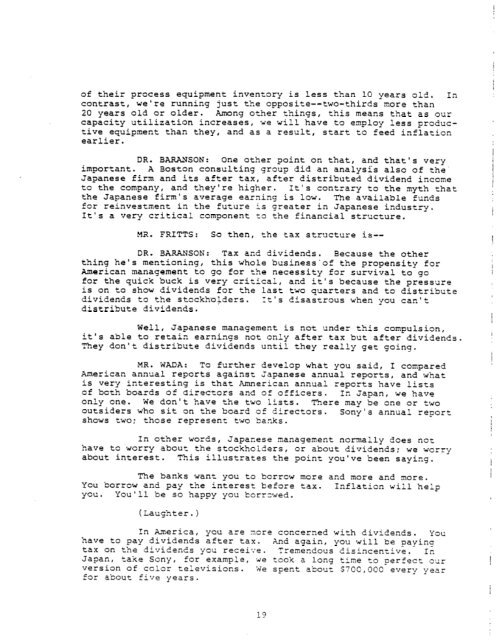Download PDF Now - LegiStorm
Download PDF Now - LegiStorm
Download PDF Now - LegiStorm
You also want an ePaper? Increase the reach of your titles
YUMPU automatically turns print PDFs into web optimized ePapers that Google loves.
of their process equipment inventory is less than 10 years old. In<br />
contrast, we're running just the opposite-- two-thirds more than<br />
20 years old or older. Among other things, this means that as our<br />
capacity utilization increases, we will have to employ less produc-<br />
tive equipment than they, and as a result, start to feed inflation<br />
earlier.<br />
DR. BARANSON: One other point on that, and that's very<br />
important. A Boston consulting group did an analysis also of the'<br />
Japanese firm and its after tax, after distributed dividend income<br />
to the company, and they're higher. It's contrary to the myth that<br />
the Japanese firm's average earning is low. The available funds<br />
for reinvestment in the future is greater in Japanese industry.<br />
It's a very critical component to the financial structure.<br />
MR. FRITTS: So then, the tax structure is--<br />
DR. BARANSON: Tax and dividends. Because the other<br />
thing he's mentioning, this whole business'of the propensity for<br />
American management to go for the necessity for survival to go<br />
for the quick buck is very critical, and it's because the pressure<br />
is on to show dividends for the last two quarters and to distribute<br />
dividends to the stockholders, It's disastrous when you can't<br />
distribute dividends.<br />
Well, Japanese management is not under this compulsion,<br />
it's able to retain earnings not only after tax but after dividends.<br />
They don't distribute dividends until they really get going.<br />
American<br />
is very<br />
MR. WADA: To further develop what you said, I compared<br />
annual reports against Japanese annual reports, and what<br />
interesting is that Amnerican annual reports have lists<br />
of both boards of directors<br />
only one. We don't have<br />
outsiders who sit on the<br />
shows two: those represent<br />
and of officers.<br />
the two lists. There<br />
board of directors.<br />
two banks.<br />
In Japan, we have<br />
may be one or two<br />
Sony's annual report<br />
In other words, Japanese management normally does not<br />
have to worry about the stockholders, or about dividends: we worry<br />
about interest. This illustrates the point you've been saying.<br />
The banks want you to borrow more and more and more.<br />
You borrow and pay the interest before tax. Inflation will help<br />
You'll be so happy you borrowed.<br />
you l<br />
(Laughter.)<br />
In -erica, you are zore concerned with dividends. You<br />
have to pay dividends after tax. tid again, you will be paying<br />
tax on the dividends you receive. Tremendous disincentive. In<br />
Japan, take Sony, for example, we took a long time to perfect our<br />
version of color televisions. 'rle spent about $700,000 every year<br />
for about five years.<br />
I


